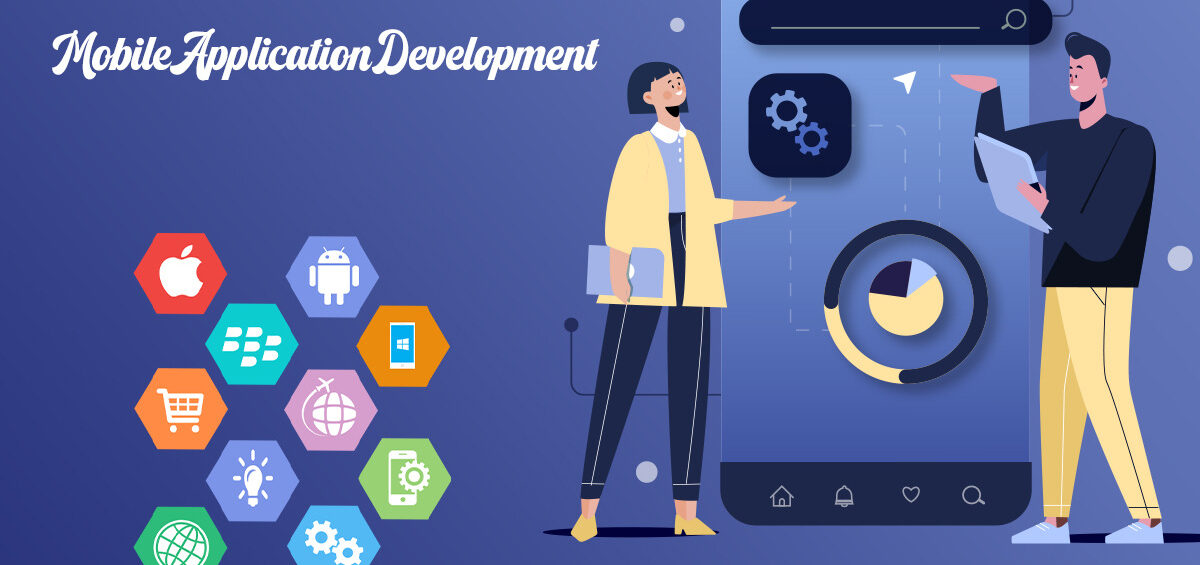How Mobile Apps are Transforming Customer Experience in 2025
How Mobile Apps are Transforming Customer Experience in 2025 is a question that businesses and tech enthusiasts alike are eager to explore. As we approach 2025, mobile apps are no longer just tools for convenience; they are becoming a critical element in shaping how brands interact with their customers. With the integration of AI, AR, and 5G technologies, mobile apps are evolving to create more personalized, efficient, and immersive experiences. This transformation is driving a shift in customer expectations, leading to higher satisfaction and engagement levels. In this blog, we will explore how mobile apps are revolutionizing customer experiences in 2025 and the cutting-edge innovations that are paving the way for these changes.
Rewriting the Significance of Mobile Apps in Today’s Business World
Over time, businesses have recognized that merely having a mobile app for the sake of convenience isn’t enough. In 2025 and beyond, mobile apps are central to offering businesses a deeper level of interaction with their customers. Today, they are key drivers of customer satisfaction, offering seamless experiences, quick resolutions to queries, and the ability to access services or products in just a few taps. Customers expect a more refined, responsive, and engaging experience, which mobile apps enable like no other platform.
Why Mobile Apps Are a Game-Changer in Customer Service
Unlike traditional customer service channels, mobile apps provide companies with a direct line to their customers. They facilitate real-time support, faster responses, and enhanced convenience for users. Whether it’s resolving issues, updating customers on the status of their orders, or providing instant feedback, mobile apps have redefined customer service expectations.
In short, these apps offer an immediate and efficient channel for communication, unlike any other traditional medium, giving businesses a competitive edge when it comes to customer satisfaction.
Key Features Driving the Mobile App Revolution
Personalization and AI Integration
Personalized experiences are now the norm. By integrating AI technology, mobile apps can anticipate users’ needs and provide highly tailored experiences. This level of customization leads to greater customer satisfaction and retention.Ease of Use and Accessibility
Mobile apps are designed for convenience. Their ability to offer easy access to services, features, and content with a few simple clicks has transformed how customers engage with brands.Increased Customer Loyalty through Rewards
Apps provide businesses with the ability to create loyalty programs, which incentivize repeat purchases and improve customer retention. Features like push notifications further engage users, reminding them about offers or rewards tailored to their behavior.
- AI-Driven Personalization: Mobile apps are using AI to offer personalized recommendations based on user preferences, making the experience more tailored.
- Augmented Reality (AR) Integration: AR will allow customers to interact with products in an immersive way, providing a unique shopping experience.
- Voice and Gesture Control: The ability to use voice and gestures to control apps will simplify user interactions and make them more intuitive.
- Real-time Customer Support: AI-powered chatbots will ensure 24/7 customer service, addressing queries instantly and improving customer satisfaction.
- Seamless Payments: Payment solutions like biometric authentication and digital wallets will provide a secure and convenient transaction experience.
Meeting Customer Expectations Through Mobile App Development
As customer expectations evolve, mobile apps must adapt to meet new demands. In 2025, customers expect mobile apps to deliver:
- Speed and Efficiency: Quick loading times and faster processing will be key in improving user satisfaction.
- Accessibility: Mobile apps will offer features like voice commands and screen readers, ensuring that everyone can easily access their services.
- Omnichannel Experience: Customers will expect a seamless transition between online and offline experiences, and mobile apps will facilitate this integration.
Examples of Mobile Apps Enhancing Customer Experience
Leading brands are already using mobile apps to enhance their customer experience. Here are a few examples:
- Starbucks: The Starbucks app uses AI to offer personalized recommendations and location-based rewards, strengthening customer loyalty.
- Amazon: Amazon’s mobile app offers personalized shopping experiences, making it easier for customers to find products based on their past purchases.
The Influence of Mobile Apps on Enhancing Customer Experience
In today’s digital landscape, mobile apps have evolved beyond being a mere supplementary tool to a company’s website. They have become essential components in shaping and improving the overall customer experience. As businesses strive to connect more deeply with their audience, mobile apps provide an effective platform for delivering personalized and streamlined services. This evolution is fundamentally transforming how brands interact with their customers, making mobile apps a core part of modern business strategies.
1. Mobile Apps: A Key Driver of Enhanced Customer Interactions
Previously, mobile apps were considered just an extension of a business’s online presence, often mirroring the website in terms of services and features. However, the role of mobile apps has drastically changed in recent years. They are now indispensable tools that play a central role in enhancing customer interactions, engagement, and satisfaction. With the advent of new technologies such as AI, 5G, and AR, apps now offer businesses a powerful means of not just delivering their products or services but also creating a personalized, memorable experience for their users.
2. The Role of Augmented Reality in Creating Engaging Shopping Journeys
Augmented Reality (AR) is revolutionizing the way customers shop, making the process more interactive, engaging, and immersive. In 2025, AR is set to become a key driver of innovation in the retail industry. Through AR technology, consumers can now visualize products in their real-world environment before making a purchase, enhancing their overall shopping experience.
For instance, AR allows users to try on clothes virtually or visualize how a piece of furniture would look in their living room. This provides a seamless integration of the physical and digital worlds, allowing customers to make more informed decisions and reduce the likelihood of buyer’s remorse. With AR, customers are no longer confined to static product images or descriptions but can engage in a more dynamic and personalized shopping experience.
Key Benefits of AR in Shopping:
Virtual Try-Ons and Product Visualization: Customers can virtually try on clothes, makeup, or accessories before purchasing, reducing uncertainty and enhancing confidence in their choices.
Enhanced Customer Engagement: Interactive AR experiences increase customer engagement by providing personalized, fun, and memorable shopping moments.
Reduced Return Rates: By giving customers a better idea of how a product fits or looks in their space, AR helps reduce the number of returns and exchanges due to dissatisfaction.
Seamless Integration: AR can be easily integrated into mobile apps, allowing brands to deliver an immersive shopping experience directly on users’ smartphones or devices.
Real-Time Product Demonstration: Customers can view real-time product demonstrations, which gives them a deeper understanding of the product’s functionality and features.
3. 5G Technology: Enabling Real-Time Interactions
The rollout of 5G technology is set to enhance mobile app performance by providing faster download speeds, lower latency, and more stable connections. This will revolutionize how customers interact with mobile apps in real-time.
With 5G, mobile apps can deliver faster streaming, smoother video calls, and better live support options. For example, video-based customer support can become more interactive, allowing users to receive immediate assistance through high-quality video feeds. Additionally, live-streaming events, virtual consultations, and real-time gaming experiences will all be significantly enhanced with 5G’s low latency and higher speeds.
For businesses, adopting 5G will lead to more engaged users, as they can access content, services, and support faster than ever before. This immediate interaction enhances the overall customer experience, as it allows users to get the information or assistance they need in real-time.
4. Voice Assistance: Simplifying Mobile Interactions
By 2025, Voice Technology Will Be Integrated as a Core Element in Mobile Applications. Virtual assistants like Siri, Google Assistant, and Alexa are already gaining popularity, and by 2025, more apps will be integrated with voice commands. Voice search and voice commands will enable users to interact with apps in a more intuitive and efficient manner.
For example, customers will be able to shop, track orders, ask questions, and make appointments using only their voice. For businesses, this opens up a whole new level of accessibility and ease of use. Customers who prefer voice commands over typing will find voice-enabled apps more convenient, and businesses will benefit from the increased customer engagement.
5. Improving Security for a Better Customer Experience
As mobile apps continue to gather more personal data, security becomes an even more critical aspect of customer experience. By 2025, users will expect mobile apps to have robust security measures in place to protect their data and privacy. Biometric authentication methods, such as fingerprint recognition and facial recognition, will become standard features in mobile apps.
Apps will also use two-factor authentication (2FA) and end-to-end encryption to ensure that sensitive data, such as payment information and personal details, is kept safe. By prioritizing security, businesses not only protect their customers but also build trust, which is a key component of long-term customer relationships.
How 5G Technology is Transforming Mobile Apps and Enhancing Customer Experience
5G technology is ushering in a new era of mobile app development, drastically improving the speed, efficiency, and capabilities of mobile applications. As the fifth generation of wireless technology, 5G is designed to offer ultra-fast download speeds, reduced latency, and more reliable connections, which are critical for improving the overall user experience. In 2025, mobile apps will increasingly rely on 5G to deliver real-time, high-quality content and services that meet the growing demands of users for instant access and seamless interaction.
With 5G, mobile apps will be able to process more data faster, enabling features such as live streaming, augmented reality (AR), virtual reality (VR), and real-time gaming to function at unprecedented levels. For businesses, this means enhanced customer engagement through highly interactive and dynamic app experiences. The improved speed and connectivity offered by 5G will enable mobile apps to provide a level of personalization that was previously impossible, offering users a more responsive and immersive experience.
In addition, 5G technology will enable real-time communication, faster video calls, and more fluid interactions with AI-powered features within mobile apps, improving customer support and making services more accessible. As mobile app developers integrate 5G into their designs, we can expect a significant shift in how customers interact with brands and products through mobile applications.
Key Benefits of 5G in Mobile Apps:
Faster Speeds and Instant Access: The faster speeds of 5G will enable mobile apps to load in an instant, improving the user experience and reducing wait times.
Enhanced AR and VR Capabilities: Augmented Reality (AR) and Virtual Reality (VR) apps will thrive under 5G, offering immersive experiences for gaming, shopping, and entertainment.
Seamless Streaming and High-Quality Content: Mobile apps will be able to deliver high-definition video streaming, live broadcasts, and real-time updates without buffering or lag.
Reduced Latency for Real-Time Interactions: 5G dramatically reduces latency, making real-time communication in apps, such as video calls or customer service interactions, more efficient and fluid.
Better Personalization and AI Integration: The low latency and speed of 5G allow for real-time data processing, enabling more tailored recommendations and better customer experiences powered by artificial intelligence.
Challenges and Opportunities in Mobile App Development for 2025
Despite the rapid advancements in mobile app development, there are challenges businesses must overcome. Privacy and security concerns are paramount, as more customer data is integrated into mobile apps. However, these challenges also present opportunities to build trust with customers by prioritizing data security and transparency.
Conclusion
Mobile app development is revolutionizing the customer experience. As technologies like AI, AR, and 5G continue to evolve, businesses can leverage mobile apps to provide more personalized, efficient, and engaging experiences. At WebsApex, we specialize in developing mobile apps that enhance customer experience, helping you stay ahead of the competition in 2025.
0







Leave a Comment